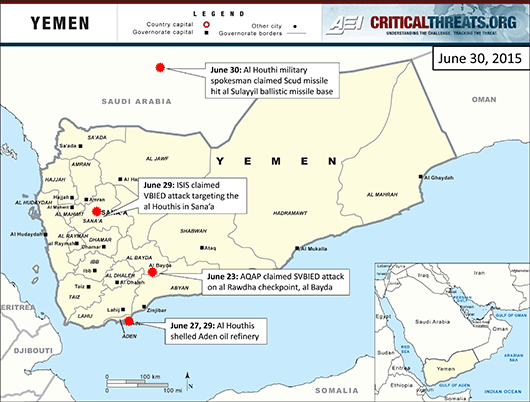The protraction the Yemen crisis is creating space for the Islamic State in Iraq and al Sham (ISIS) to expand and potentially drive the conflict toward sectarian war. ISIS’s growth in Yemen has not affected the ability of al Qaeda in the Arabian Peninsula’s (AQAP) to operate there. AQAP’s insurgent fight is ongoing, despite recent leadership losses.
ISIS Wilayat Sana’a is conducting a vehicle-borne improvised explosive (VBIED) campaign against al Houthi targets in Yemen’s capital. The group claimed credit for a bombing that injured at least 28 people near a military hospital in al Siyah area in Shu’aub district in Sana’a on June 29. ISIS Wilayat Sana’a claimed two previous VBIED attacks in Sana’a: a VBIED attack on Qiba al Mahdi mosque on June 20 and four VBIEDs that exploded nearly simultaneously on June 17, the first night of the Islamic holy month of Ramadan. ISIS uses sectarian language in its claims of responsibility and appears to be framing the bombings as an anti-al Houthi campaign.
AQAP’s insurgent force, Ansar al Sharia, is combatting the al Houthis in al Bayda, Shabwah, and Ma’rib governorates, where it may be integrating into local, active resistance movements. There is circumstantial evidence in both al Bayda and Shabwah that Ansar al Sharia is at least coordinating with the local militias. In al Bayda governorate, Ansar al Sharia is likely responsible for a suicide vest attack in the capital city, al Bayda, on June 30 that killed three people and has claimed credit for a series of bombings in the area of al Bayda city, including a June 23 suicide VBIED at al Rawdha checkpoint. Ansar al Sharia also claimed activity supporting local popular resistance forces in Rada’a district, where they have regained control of al Zawb and parts of Qayfa. In Shabwah governorate, Ansar al Sharia claimed credit for an improvised explosive device (IED) that killed five al Houthis on June 21 in the capital city, Ataq, and for an IED attack in Bayhan, where local popular resistance forces are also fighting the al Houthis. In Ma’rib governorate, Ansar al Sharia claimed attacks in Jafina and al Ashraf areas on June 22-24, and local popular resistance forces held off al Houthi advances in Sirwah and Attaf.
The al Houthis’ military spokesman claimed a Yemeni Scud missile struck a Saudi Arabian military base. Spokesman Brigadier General Sharaf Luqman said that a Scud missile targeting the al Sulayyil ballistic missile base in Wadi al Dawasir in Riyadh province, Saudi Arabia, hit its target. Luqman said the Scud missile was another message to Saudi Arabia to stop “attacks and injustice against the Yemeni people.” The Saudi Ministry of Defense denied Luqman’s claim. Yemen has Scud-B missiles with a range of approximately 300km. Al Sulayyil ballistic missile base is over 350km from the Yemeni border. Al Houthi militants have continued low-level attacks along the Saudi Arabian border, including a June 25 shelling attack that killed three Saudi soldiers and an Emirati officer.
UN-led efforts to reach a political solution in Yemen continue. UN envoy Ismail Ould Cheikh Ahmed traveled to Kuwait on June 27 and will then shuttle between Riyadh and Sana’a to discuss terms for a preliminary agreement. The Sultanate of Oman sponsored talks, cast as part of the overall UN effort in Yemen, between the al Houthi movement and southern leaders to negotiate a humanitarian ceasefire. A recent partial withdrawal from Aden may indicate progress in talks between the al Houthis and local powerbrokers; however, the al Houthis recently fired missiles at the Aden oil refinery and continue to clash with southerners in Aden city. Yemen’s government-in-exile, headed by President Abdu Rabbu Mansour Hadi, is seeking support from the U.S., UK, Russia, and others for the full implementation of UN Security Council Resolution 2216, which called for the al Houthis to turn over seized territory and disarm.
Both ISIS and AQAP will continue to benefit from the conflict in Yemen. ISIS Wilayat Sana’a’s Ramadan campaign against the al Houthis is an attempt to further stoke sectarian tensions in the country. AQAP continues to support the fight against the al Houthis and has been able to take advantage of the popular momentum in Yemen to expand its support base.
Joseph Hughes and Joshua Koontz contributed research for this publication.
← PREVIOUS |
NEXT → |

